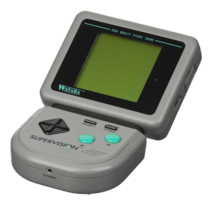Supervision

| |
| Developer | Watara |
|---|---|
| Type | Handheld game console |
| Generation | Fourth generation |
| Release date | 1992 |
| Introductory price | $49.95 |
| Emulated | ✓ |
The Watara Supervision, also known as the QuickShot Supervision in the UK and as the Travell-Mate in parts of Asia, is a monochrome handheld game console which was introduced in 1992 as a low-cost competitor for Nintendo's Game Boy. It came packaged with a game called Crystball, which is similar to Atari’s Breakout. One unique feature of the Supervision was its TV-Link peripheral, which allowed the console to be connected to a television and its games to be played in limited colour, a handful of years before Nintendo’s own Super Game Boy. It featured very similar capabilities to the Game Boy, but with a much bigger and slightly higher resolution screen. Sadly, it was much blurrier as well, which did not help its sales, already hampered by the lack of recognisable titles and the overall poor quality of most of its games. It later received a minor hardware revision in the form of the Magnum Supervision, for which only one exclusive game was developed, Journey to the West.
Emulators[edit]
| Name | Platform(s) | Version | Retro Achievements |
TV-Link | Magnum | FLOSS | Active | Recommended |
|---|---|---|---|---|---|---|---|---|
| PC / x86 | ||||||||
| Potator potator_libretro |
libretro core 1.0.19 (Potator-SDL2) 0.6 (Legacy) |
✓[N 1] | ✗ | ✓[N 2] | ✓ | ~[N 3] | ✓ | |
| Wataroo | 0.8.0.0 | ✗ | ✗ | ✓ | ✗ | ~ | ✓ | |
| MAME | 0.265 libretro core |
✗ | ✗ | ✗ | ✓ | ✓ | ~ | |
| Consoles / Handhelds | ||||||||
| Potator PSP | 1.0.6 | ✗ | ✗ | ? | ✓ | ✗ | ✓ | |
| Potator | 1.1 | ✗ | ✗ | ✗ | ✓ | ✗ | ~ | |
| Potator2x | R1 | ✗ | ✗ | ✗ | ✓ | ✗ | ~ | |
| WasabiDS (山葵DS) | 0.2.2 | ✗ | ✗ | ✓ | ✓ | ✓ | ~ | |
| PotatorDS | R1 | ✗ | ✗ | ✗ | ✓ | ✗ | ✗ | |
| Wasabi (山葵) | 0.2.3 | ✗ | ✗ | ✓ | ✓ | ✓ | ✗ | |
| Calculators | ||||||||
| Potator | archive | ✗ | ✗ | ? | ✓ | ✗ | ~ | |
Comparisons[edit]
- Potator
- The first Supervision emulator, originally developed for Windows using SDL. Surprisingly old, it was last updated in 2005. The sound emulation is only preliminary and there are a lot of bugs and inaccuracies.
- Potator2x
- Potator’s first fork was a port to the GP2X handheld, abandoned in 2007. This port would serve as base to all subsequent forks, including the libretro version and the Windows SDL2 version.
- Potator (SDL2)
- Potator’s return to Windows after a chain of handheld ports is one of the very few emulators to support the Magnum and thus Journey to the West. The UI is very barebones, but the emulation is pretty much flawless. Stopped being updated in 2019.
- PotatorDS
- This emulator is pretty much just a proof-of-concept. It is extremely slow and there is no sound. There is no UI either, and no option to choose a ROM – it always reads from
/sv/test.sv.
- Wataroo
- A more traditional-looking, fully-featured emulator developed by renowned Atari homebrewer Osman D. after he lost a bet. Like Potator (SDL2), the emulation is pretty spot-on, but despite having really low system requirements, working even under Windows 95, it may chug on less powerful PCs.
- MAME
- Runs relatively fine, but the sound emulation isn’t quite there yet. This is especially bad with Classic Casino’s sampled speech.
- Wasabi
- Another slow and silent proof-of-concept, Wasabi was originally released in 2004 as a plugin for the PogoShell flashcart CFW system. The developer picked it back up in late 2022, porting it to the Nintendo DS through devkitPro and then porting it back to the GBA. The latest versions seem to be relatively accurate, with the dev claiming to have full compatibility with the entire commercial library, including the Magnum exclusive. However, the GBA port is still very slow and has no sound, and the DS version seems to have its speed limiter set slightly too fast, with all non-sampled sounds playing in an accordingly higher pitch. The GBA version requires building a compilation to load ROMs.
TV-Link emulation[edit]
Being incredibly rare due to its pitifully low sales, the TV-Link add-on isn’t well understood yet. Currently, no emulator supports it at all, but it is on both Wataroo and Wasabi’s roadmaps.